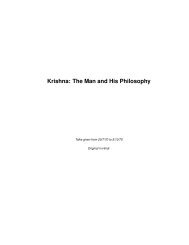The Empty Boat - Osho.pdf - Oshorajneesh.com
The Empty Boat - Osho.pdf - Oshorajneesh.com
The Empty Boat - Osho.pdf - Oshorajneesh.com
Create successful ePaper yourself
Turn your PDF publications into a flip-book with our unique Google optimized e-Paper software.
CHAPTER 5. THREE IN THE MORNING<br />
A man of understanding always looks at objective conditions, never at his subjective feelings. When<br />
the monkeys said no, if you had been the monkey trainer you would have felt offended. <strong>The</strong>se<br />
monkeys were trying to rebel, they were being disobedient, this could not be toler-ated. It would<br />
have hurt you inside.<br />
You get angry even at dead things. If you are trying to open the door and it resists, you get mad. If<br />
you are trying to write a letter and the pen is not functioning well, smoothly, you get angry. You feel<br />
hurt, as if the pen is doing it knowingly, as if there is someone in the boat. You even feel somebody<br />
is there in the pen trying to disturb you.<br />
And this is not only the logic of small children, this is your logic also. If a child bumps into a table, he<br />
will hit it just to right the wrong, and he will always be an enemy of that table. But you are the same<br />
– with dead things, with objects, you also get angry, you get mad!<br />
This is subjective, and a wise man is never subjective. A wise man always looks at the objective<br />
conditions. He will look at the door, and if it is not open, then he will try to open it. But he cannot get<br />
angry with it because the boat is empty. <strong>The</strong>re is nobody there trying to shut the door, resisting your<br />
efforts.<br />
In order to meet objective conditions the trainer changed his personal arrangement. He looked at<br />
the monkeys and their minds, he didn’t feel offended – he was a monkey trainer, not a monkey. He<br />
looked and he must have laughed within, because he knew the total. And he yielded. Only a wise<br />
man yields. A foolish man always resists. Foolish people say it is better to die than to bend, better<br />
to break than to bend.<br />
Lao Tzu and Chuang Tzu always say: When there is a strong wind the foolish egoistic trees resist<br />
and die, and the wise grass bends. <strong>The</strong> storm goes by and again the grass stands straight, laughing<br />
and enjoying. <strong>The</strong> grass is objective, the big tree is subjective. <strong>The</strong> big tree thinks so much of<br />
himself: ”I am somebody, who can bend me? Who can force me to yield?” <strong>The</strong> big tree will fight with<br />
a storm. It is foolish to fight with the storm, because the storm has not <strong>com</strong>e for you. It is nothing<br />
special, the storm is simply passing and you are there, it is coincidental.<br />
Monkeys are animals and think themselves very superior animals! <strong>The</strong>y are not offending the<br />
monkey trainer. Monkeys are just monkeys. That is the way they are. <strong>The</strong>y cannot look at the<br />
total, they cannot add up. <strong>The</strong>y can look only at the near, not at the far – the far is too far for them.<br />
It is impossible for them to conceive of the evening, they only know about the morning.<br />
So monkeys are monkeys, storms are storms. Why get offended? <strong>The</strong>y are not fighting you. <strong>The</strong>y<br />
are only following their own ways, their own habits. So the monkey trainer was not offended. He<br />
was a wise man, he yielded, he was just like the grass. Remember this when-ever you start feeling<br />
subjective. If somebody says something, immediately you feel hurt, as if it has been said to you.<br />
You are in the boat too much. It may not have been said to you at all. <strong>The</strong> other may be expressing<br />
his or her subjectivity.<br />
When somebody says, ”You have insulted me,” what is really meant is something else. If he had<br />
been a little more intelligent he would have said it the other way around. He would be saying, ”I feel<br />
insulted. You may not have insulted me, but whatsoever you have said, I feel insul-ted.” This is a<br />
subjective feeling.<br />
<strong>The</strong> <strong>Empty</strong> <strong>Boat</strong> 96 <strong>Osho</strong>
















